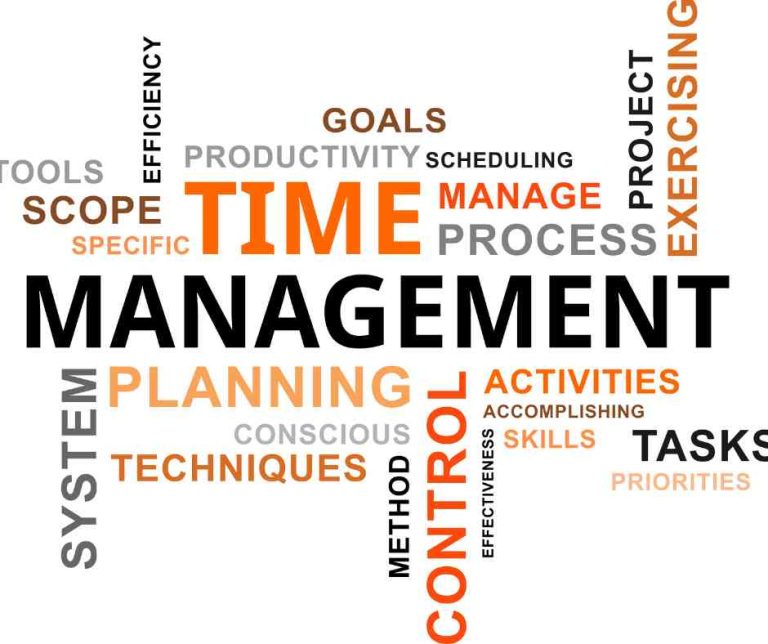Improving time management among team members!
Okay – let’s get something straight! Time management is about self-management. Time is unmanageable, it is a finite resource. Do you want to make more money? Sure, no problem. Do you want to make more time? Well, there are only 168 hours this week and some sleep would be good… So the question really is, how can I and my team self-manage ourselves to maximise our use of the limited time that we have?
So let’s think about how the team improves their self-management and how as business owners, leaders, and managers we improve our management of them. What are we looking for?
- Clear knowledge of what needs to be achieved and clear priorities.
- Better structure of the working week to fit everything in.
- Better planning of the working day to ensure everything gets done.
- Reduced distractions to maximise efficiency.
- Self-management and review to seek constant improvement.
What results might that give us? Better performance, better decision making, better results, higher achievements, and a happier team. Here are some suggestions on how to achieve that.
Priorities:
Team members with clear roles, responsibilities, and key performance indicators (KPIs) are clear on what they have to achieve. There is no room for procrastination through internal uncertainties “Oh, sorry I didn’t realise…”. Great position contracts give the team member ownership of their job, they significantly improve the likelihood of their outcomes for the business being achieved and give the manager or business owner an improved result.
Organisation & Planning:
Plan your work, work your plan. If your team is going to self-manage really well and they are clear about their objectives, then they need to allocate an appropriate amount of time to complete the necessary tasks as part of their working routine. This is best achieved by the use of a Default Diary. The default diary sets out what tasks should be done and when every week. It allows for planning the necessary meetings and collaboration time in the schedule, fitting in blocks of time for tasks that are deadline-driven and blocks of time for achieving other tasks or responsibilities. Preparing the default diary for yourself and with your team members for them starts you thinking about what proportion of time each team member should be devoted to the different elements of their job.

The planning of tasks into blocks allows for more efficient working. It is never efficient for work to be picked up and put down, too much time is lost in the re-familiarisation of where you are in the process. Where did you get up to? What were you thinking came next? So the discipline of planning what you need to work on when, and then working on it when you planned to is a great self-management discipline.
Join the NoLimits Business Community
Are you a business owner looking to take your business to the next level? Join our innovative community of like-minded professionals and gain access to a wealth of valuable resources, including a community portal to chat with other business owners, ebooks, business development software, and growth events that will transform the way you do business. Best of all, these resources are completely free and will be available to you forever.
But the benefits of joining our NoLimits business community don’t stop there. By becoming part of our community, you’ll have the opportunity to connect with other business owners, share insights and ideas, and build valuable relationships that will help your business thrive. Don’t miss out on this amazing opportunity to supercharge your business and join us today!
Daily Planning:
Having set up the weekly default diary, the act of daily planning is a huge win in self-management. The last task of any day should be to plan tomorrow, a ten-minute job. Why? Firstly you know what is left over from today that needs to be done, follow-up calls or emails, must-do or tasks to delegate, they get listed. Secondly, the time gets allocated between these, the tasks that will be new to tomorrow that need completing, and all with an eye on the quarter’s goals and what you are normally doing that day of the week. You then have a strong plan for the following day. Thirdly, when you start your day you have a plan and hit the ground running.
Additionally, there is an enormous personal benefit of this daily planning routine – how many times when you haven’t planned tomorrow do you find yourself sitting at home in the evening thinking “I must remember to… tomorrow!” and then promptly forgetting and not remembering tomorrow. Great daily planning allows you to stop thinking about what you need to remember because it is in the plan, for tomorrow. So you can switch off and enjoy your downtime more.

Reduce the interference, and remove the distractions:
In the modern world we are a slave to modern communications, are we not? The computer has email and other social media apps on it, pop-ups in the corner of your screen. WhatsApp, Facebook, Instagram, Email, SMS, and countless others… The smartphone flashes or vibrates if it is on silent or worse still the smartwatch alerts you to it if you can’t see it. All these interruptions, going ping. What do we do? We look at them. How often are they really important? Not often. How do we ever get anything done?
Are we controlling these things or are they controlling us?
If you are in a meeting with an important customer trying to close a sale, do you answer your phone or email while you are talking to them? Most likely not as you’re not likely to get the sale, it’s rude. You focus on them.
When you are sitting at your desk trying to work through a dull but important piece of work and something pings or pops up on the screen, do you look at it? Probably yes. How often is it important? More important than what you should and need to be doing? Not often, but you have allowed yourself to become distracted.
Modern communications have made us feel like we have to be instant in our responses, but do we? If we have all of these things interrupting our flow of thought and work, how inefficient have we really become? Are these interruptions important enough to warrant the disturbance to what we should be focusing on?
Most communications are not urgent in the sense that they need to be dealt with there and then, a few possibilities are and allowance can be made for this. If you and your team devise a set of rules for periods of uninterrupted working, how much more work would get done?
A client’s story.
This is a true story about one of my clients who made some changes to the way he was working in 2021. Let’s call him Dave.
Dave has a consultancy business in which he has to pull together large and complex reports. This work was taking up around 25 hours per week and he really wasn’t enjoying it. Dave was already using default diary and daily planning and in investigating what the interruptions were during his day we found his problem was the constant noise and distraction of messages that were neither sufficiently urgent nor important enough to warrant the distraction.
Dave changed his routine, arriving at his desk at 8am with a coffee and his plan from the day before. He would spend 15 minutes on overnight electronic traffic and dealing with what needed to be dealt with. At 8.15 he switched everything off, phone, email, messaging Apps then focused on his report work. At 1015 he switched everything back on again and went to make a coffee, checked what had come in, dealt with anything urgent, then switched it all off again at 1030 to go back to his report work. At 1230 he switched everything back on again, checked nothing needed dealing with before lunch, then got on with the rest of his day. The 25 hours per week of report work was being achieved in 15 hours and he was able to devote 10 additional hours per week to growing his business, going on to employ someone to do this work that he was no longer enjoying as the business grew.
Implementation of improved self-management
You might get pushback on setting up a default diary, daily planning, and removal of interference and distractions for your team, they might see it as a bit controlling or unnecessary at first. Before you try to set it up with your team, set it up for yourself along with daily planning and see how it works for you. Once you know the benefits, it is easier to work out how to pitch this to your team to generate buy-in. They will already have noticed the difference and improvement in your performance!
Give it a go, if you need any help, reach out to a business coach.

Join the NoLimits Business Community
Are you a business owner looking to take your business to the next level? Join our innovative community of like-minded professionals and gain access to a wealth of valuable resources, including a community portal to chat with other business owners, ebooks, business development software, and growth events that will transform the way you do business. Best of all, these resources are completely free and will be available to you forever.
But the benefits of joining our NoLimits business community don’t stop there. By becoming part of our community, you’ll have the opportunity to connect with other business owners, share insights and ideas, and build valuable relationships that will help your business thrive. Don’t miss out on this amazing opportunity to supercharge your business and join us today!
By Tom Allchurch

